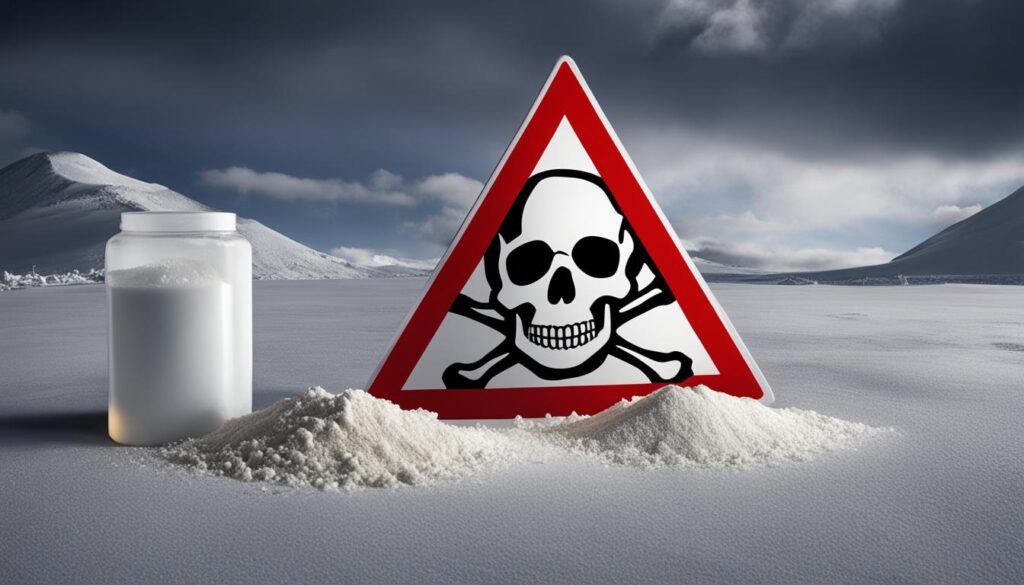Welcome to an informative guide on the versatile compound, calcium carbonate. In this article, I will delve into the various ways to use calcium carbonate, its numerous health benefits, and its applications in do-it-yourself (DIY) projects. Whether you’re looking to improve your health or engage in creative endeavors, calcium carbonate has something to offer. So, let’s explore the world of calcium carbonate and discover its potential.
Key Takeaways:
- Calcium carbonate is a versatile compound used for a variety of purposes.
- It offers numerous health benefits, including treating heartburn and acid reflux.
- Calcium carbonate can be used in various DIY projects to enhance properties and create vibrant colors.
- It is important to follow the recommended dosage and be aware of potential side effects.
- Calcium carbonate has uses in the food industry as a fortifier and natural colorant.
The Science behind Calcium Carbonate
Calcium carbonate is an inorganic compound with the chemical formula CaCO3. It is one of the most commonly seen chemical compounds and can be found in various forms, such as limestone and marble. The composition of calcium carbonate consists of calcium ions (Ca2+) combined with carbonate ions (CO32-). This compound is non-toxic and odorless and occurs naturally in the form of limestones, chalks, marbles, and pearls.
Calcium carbonate is a fascinating compound with a rich scientific background. Its composition gives it unique properties that make it useful in various applications. Let’s explore the science behind calcium carbonate and dive deeper into its composition and structure.
The composition of calcium carbonate, comprising calcium ions and carbonate ions, plays a significant role in its chemical properties and applications.
Calcium carbonate is formed through natural processes that involve the deposition and compaction of calcium-rich materials over long periods. Limestone, for example, is composed mainly of calcium carbonate and is often formed from the remains of marine organisms such as coral and shells.
The calcium ions in calcium carbonate are positively charged, while the carbonate ions are negatively charged. This gives the compound its overall neutral charge. The strong electrostatic attraction between the calcium and carbonate ions holds the compound together in its crystalline structure.
The composition of calcium carbonate also determines its solubility in water. The carbonate ions can react with water molecules, forming bicarbonate ions and hydroxide ions. This reaction plays a crucial role in the natural weathering of calcium carbonate-containing rocks and minerals.
The utilization of calcium carbonate in various industries, such as healthcare, construction, and agriculture, is due to its unique composition and properties. Its wide availability and non-toxic nature make it a versatile compound with a wide range of applications.
To visualize the composition and structure of calcium carbonate, refer to the image below:
Health Benefits of Calcium Carbonate
Calcium carbonate is widely recognized for its health benefits, making it a popular choice as a dietary supplement. Its primary advantage lies in its ability to provide the body with the essential mineral calcium, which plays a crucial role in maintaining strong bones and teeth. By ensuring an adequate intake of calcium carbonate, individuals can promote skeletal health and reduce the risk of conditions such as osteoporosis.
Moreover, calcium carbonate has proven effective in treating heartburn and acid reflux, offering relief from the discomfort caused by these conditions. It achieves this by neutralizing excess stomach acid, thereby alleviating the burning sensation and addressing symptoms associated with heartburn and acid reflux.
Integrating calcium carbonate into your daily routine can contribute to overall digestive health and well-being. With its ability to support bone strength and combat gastrointestinal issues, calcium carbonate offers a holistic approach to maintaining optimal health.

| Health Benefits of Calcium Carbonate |
|---|
| Bone and Dental Health |
| Prevention of Osteoporosis |
| Treatment of Heartburn and Acid Reflux |
| Promotion of Digestive Health |
“Calcium carbonate plays a vital role in supporting bone health and preventing osteoporosis, a condition characterized by weakened bones. Additionally, it provides relief from heartburn and acid reflux symptoms, contributing to improved digestive well-being.”
Dosage and Side Effects of Calcium Carbonate
When it comes to using calcium carbonate, it is important to be aware of the appropriate dosage and potential side effects. The recommended dosage can vary based on factors such as age, sex, and overall health. To ensure safe and effective use, it is best to follow the instructions on the product label or consult a healthcare professional for personalized guidance.
While calcium carbonate is generally considered safe for most people, it is not without possible side effects. Some individuals may experience mild digestive discomfort, such as constipation, gas, or bloating. These symptoms are typically temporary and can be managed by adjusting the dosage or taking calcium carbonate with food.
However, it is crucial to take note of any severe or persistent side effects. If you experience severe gastrointestinal symptoms, allergic reactions, or any other concerning symptoms, it is recommended to discontinue the use of calcium carbonate and seek medical attention immediately.
| Common Side Effects of Calcium Carbonate | Severe Side Effects of Calcium Carbonate |
|---|---|
|
|
The table above provides an overview of the common side effects and severe side effects of calcium carbonate. It is important to monitor your body’s response to the supplement and seek medical advice if you experience any alarming symptoms.
Remember, while calcium carbonate can offer benefits, it is crucial to use it responsibly and be mindful of any potential side effects. Not everyone will experience side effects, but it is always wise to be vigilant and prioritize your health and well-being.
Calcium Carbonate Uses in Food
Calcium carbonate plays a crucial role in the food industry, serving as both a calcium fortifier and a natural food colorant. Its versatile properties make it a popular ingredient in a wide range of food products, including baked goods, dairy products, and beverages.
Let’s explore the various applications of calcium carbonate in food:
1. Baking Products
In baking, calcium carbonate is commonly used as a leavening agent to improve texture and promote proper rising. It helps create light and fluffy cakes, cookies, and pastries. Additionally, calcium carbonate can enhance the color of baked goods, giving them an appealing golden hue.
2. Dairy Products
Calcium carbonate is often added to dairy products like yogurt and cheese to fortify them with essential calcium. It helps maintain strong bones and teeth and supports overall bone health. Incorporating calcium carbonate into dairy products ensures that consumers receive an adequate intake of this vital mineral.
3. Beverages
Many beverages, such as fruit juices, plant-based milk alternatives, and nutritional drinks, benefit from the addition of calcium carbonate. It not only provides a calcium boost but also enhances the stability and appearance of the beverage. Calcium carbonate in powdered form can act as an anti-caking agent, preventing clumping and ensuring a smooth drinking experience.
Here’s an illustrative table showcasing some examples of food products that utilize calcium carbonate:
| Food Product | Calcium Carbonate Uses |
|---|---|
| Bread | Texture enhancement and color enrichment |
| Cheese | Calcium fortification |
| Fruit Juice | Stability improvement and anti-caking properties |
| Yogurt | Calcium enrichment and texture enhancement |
Note: The table above is just a small representation of the extensive use of calcium carbonate in the food industry.
Calcium carbonate’s ability to improve the textural properties, stability, and appearance of various food products makes it a valuable ingredient. Additionally, its natural origin and health benefits contribute to its widespread use in the food industry.
Adding calcium carbonate to food products not only enhances their quality but also contributes to a well-balanced diet by providing the essential mineral calcium. With its multitude of applications in the culinary world, calcium carbonate continues to play a vital role in shaping the food industry.
Calcium Carbonate Powder: DIY Projects
When it comes to DIY projects, calcium carbonate powder is a game-changer. Its versatility and unique properties make it an ideal ingredient for a wide range of creative endeavors. Whether you’re looking to improve the performance of paint, putty, or resin, or create homemade chalks, clay, and soap, calcium carbonate powder has got you covered.
One of the key benefits of using calcium carbonate powder in DIY projects is its ability to act as a filler. Adding it to paint, putty, or resin not only enhances their properties but also improves their performance. The powder fills in gaps and provides a smoother, more even finish, giving your projects a professional touch.
But that’s not all. Calcium carbonate powder can also be used to create your very own homemade chalks, clay, and soap. Its fine texture allows for easy blending and molding, while its high brightness ensures vibrant colors that will make your creations stand out.
“Calcium carbonate powder is a versatile material that adds depth and quality to DIY projects. Its ability to fill in gaps and provide a smooth finish is unmatched. So go ahead, let your creativity shine with calcium carbonate powder!”
So, whether you’re a seasoned DIY enthusiast or just starting out, consider incorporating calcium carbonate powder into your projects. Its wide range of uses and exceptional properties will take your creations to the next level.
Calcium Carbonate Supplements: Meeting Daily Calcium Needs
For individuals who struggle to obtain sufficient calcium from their diet alone, calcium carbonate supplements provide a convenient solution. Available over-the-counter, these supplements come in the form of tablets or capsules and offer the benefits of convenient dosage and optimal calcium absorption.
To ensure that you are getting the most out of your calcium carbonate supplement, it’s important to choose a reputable brand and follow the recommended dosage. This will help maximize the absorption of calcium and support overall bone health.

The Importance of Meeting Daily Calcium Needs
Calcium is an essential mineral that plays a crucial role in maintaining strong bones and teeth, supporting proper nerve function, and promoting healthy blood clotting. Meeting your daily calcium needs is vital for overall health and well-being.
Calcium carbonate supplements can help prevent calcium deficiency, which can lead to an array of health issues including osteoporosis, weak bones, and dental problems. By incorporating these supplements into your daily routine, you can ensure that your body receives an adequate intake of calcium.
Choosing the Right Calcium Carbonate Supplement
When selecting a calcium carbonate supplement, it’s important to consider factors such as the reputation of the brand, the quality of the product, and the recommended dosage. By choosing a reliable brand and following the recommended dosage, you can feel confident in the effectiveness of the supplement.
Remember, always consult with a healthcare professional before starting any new supplement regimen.
The Benefits of Calcium Carbonate Supplements
- Convenient way to meet daily calcium needs
- Promote strong bones and teeth
- Prevent calcium deficiency and associated health issues
- Support proper nerve function and blood clotting
Incorporating calcium carbonate supplements into your daily routine can be an effective way to support your overall health and well-being. Remember to consult with a healthcare professional for personalized advice and to ensure the supplements are appropriate for your specific needs.
Calcium Carbonate for Heartburn and Acid Reflux
When it comes to finding relief from heartburn and acid reflux, calcium carbonate is a commonly used antacid. Its ability to neutralize excess stomach acid provides quick relief from the discomfort and burning sensation associated with these conditions. Calcium carbonate can be easily obtained in various forms, including chewable tablets and liquid suspensions, making it convenient for on-the-go relief.
One effective way to utilize calcium carbonate for heartburn and acid reflux is by taking chewable tablets. These tablets are designed to be easily consumed and offer fast-acting relief. Simply chew and swallow a tablet when symptoms arise to help alleviate the discomfort. Alternatively, liquid suspensions of calcium carbonate can be found in convenient bottles with the recommended dosage provided for easy administration.
It’s important to note that when using calcium carbonate for heartburn and acid reflux, following the recommended dosage is crucial. If symptoms persist or worsen, it is advisable to seek guidance from a healthcare professional who can provide further assistance and recommendations.
Now, let’s take a closer look at the benefits and potential side effects of calcium carbonate, as well as its uses in various applications.
Calcium Carbonate: Safety and Precautions
While calcium carbonate is generally considered safe for most people, it is essential to be aware of certain precautions. Adhering to the recommended dosage and avoiding exceeding the daily intake of calcium is crucial to maintain optimal health. Individuals with specific medical conditions, such as kidney stones or hypercalcemia, should consult a healthcare professional before using calcium carbonate to ensure its suitability for their particular case. Additionally, it is important to note that calcium carbonate supplements may interact with certain medications, potentially affecting their absorption.
When using calcium carbonate, it is essential to prioritize safety and take the necessary precautions to avoid any potential risks. Consulting a healthcare professional is always beneficial, as they can provide personalized advice based on individual health circumstances.
Remember:
- Follow the recommended dosage of calcium carbonate
- Avoid exceeding the recommended daily intake of calcium
- Consult a healthcare professional if you have kidney stones or hypercalcemia
- Avoid taking calcium carbonate supplements with medications without consulting a healthcare professional

Ensuring safety and following precautions associated with calcium carbonate usage is vital for maintaining one’s well-being and optimizing the potential benefits offered by this compound.
Calcium Carbonate and Other Minerals: Synergistic Effects
Calcium carbonate, when combined with other minerals, can produce synergistic effects that enhance overall health and well-being. These interactions between minerals play a crucial role in various bodily functions and can have a significant impact on our overall health.
Calcium and Vitamin D: A Perfect Combination for Bone Health
When it comes to promoting bone health, the combination of calcium carbonate and vitamin D is a powerhouse. Calcium is essential for building and maintaining strong bones, while vitamin D aids in the absorption of calcium in the body. Together, they enhance calcium absorption and support the development of healthy bones and teeth.
The synergistic effects of calcium and vitamin D not only strengthen bones but also help prevent conditions like osteoporosis, a condition characterized by weak and brittle bones. Ensuring an adequate intake of both calcium carbonate and vitamin D can significantly contribute to maintaining optimal bone health.
Enhancing Bone Health with Magnesium and Calcium Carbonate
Magnesium, another essential mineral, also plays a vital role in maintaining bone health. Studies have shown that combining magnesium with calcium carbonate can have a synergistic effect, further enhancing bone strength and density. This combination may help in preventing osteoporosis, a common age-related condition that leads to bone fragility and increased fracture risk.
By balancing the intake of various minerals, including calcium carbonate, magnesium, and vitamin D, individuals can optimize their overall bone health and reduce the risk of developing debilitating bone conditions.
Optimizing Health with a Balanced Intake of Minerals
While the focus of this section is primarily on the synergistic effects of calcium carbonate with other minerals, it is essential to highlight the significance of maintaining a well-rounded intake of various minerals for overall health. Each mineral has its unique role in supporting bodily functions, and an imbalance in mineral levels can have adverse effects on our well-being.
By incorporating a diverse range of nutrient-rich foods into our diet, we can ensure a balanced intake of minerals. Additionally, consulting with a healthcare professional or a registered dietitian can provide valuable guidance on meeting our individual mineral needs based on factors such as age, gender, and overall health.
| Mineral | Role in the Body | Food Sources |
|---|---|---|
| Calcium | Building strong bones and teeth, muscle function, nerve transmission | Milk, cheese, yogurt, leafy greens, tofu |
| Vitamin D | Enhances calcium absorption, supports immune function | Sunlight exposure, fortified dairy products, fatty fish |
| Magnesium | Supports bone health, muscle function, energy production | Nuts, seeds, whole grains, leafy greens |
“A balanced intake of various minerals is key to promoting overall health and well-being.”
By understanding the synergistic effects of minerals, such as calcium carbonate, and incorporating a diverse range of nutrient-rich foods into our diet, we can optimize our overall health and well-being. Additionally, managing mineral intake in consultation with healthcare professionals can ensure that we meet our individual nutritional needs, paving the way for a healthier and more vibrant life.
Calcium Carbonate in Environmental Applications
Calcium carbonate plays a crucial role in various environmental applications, offering sustainable solutions to reduce pollution and promote ecological balance. Let’s explore some of the key ways in which calcium carbonate contributes to environmental preservation:
1. Neutralizing Acidic Wastewater
Calcium carbonate is widely used to neutralize acidic wastewater generated by industrial processes. By raising the pH level of the water, calcium carbonate helps neutralize harmful acids, preventing damage to aquatic ecosystems and promoting the safe disposal of wastewater.
2. Reducing Environmental Impact
In industrial processes, calcium carbonate can be used as an additive to minimize the environmental impact of various operations. Its ability to capture and bind harmful pollutants helps reduce air and water pollution, making it an effective and eco-friendly solution for sustainable manufacturing.
3. Filling Biodegradable Plastics
As society shifts towards more environmentally friendly alternatives, the use of biodegradable plastics is increasing. Calcium carbonate acts as a filler in these plastics, enhancing their mechanical properties and reducing their overall environmental footprint. By incorporating calcium carbonate, biodegradable plastics become more sustainable and help reduce plastic waste in landfills and oceans.
4. pH Regulation in Soil
Calcium carbonate can be used as a pH regulator in soil to improve its fertility and support optimal plant growth. By neutralizing acidic soil, calcium carbonate creates a more favorable environment for nutrient absorption and enhances soil structure, contributing to healthy and productive agricultural practices.
In summary, calcium carbonate’s environmental applications extend beyond its traditional uses. It serves as a valuable tool in neutralizing acidic wastewater, reducing pollution, enhancing biodegradable plastics, and improving soil fertility. Embracing calcium carbonate in various industries can contribute to a greener and more sustainable future.
Conclusion
Calcium carbonate is a versatile compound that offers a wide range of uses and benefits. From its role as a supplement and antacid in the health industry to its applications in the food and DIY sectors, calcium carbonate has proven to be a valuable addition to various products and processes.
However, it is crucial to note that using calcium carbonate responsibly is essential. Following the recommended dosage and taking necessary precautions is key to ensuring its effective and safe utilization. As with any supplement or compound, it is always advisable to consult a healthcare professional before incorporating calcium carbonate into your routine.
In conclusion, calcium carbonate holds immense potential for improving health and enhancing daily life. Its versatility, combined with its wide availability in different forms such as supplements and powders, makes it a valuable compound for individuals seeking to improve their well-being and for various industries looking to enhance their products. With proper usage and consideration of personal health conditions, calcium carbonate can be a beneficial addition to one’s lifestyle.
FAQ
How should calcium carbonate be used?
Calcium carbonate can be used as a supplement to provide the body with calcium, as a treatment for heartburn and acid reflux, and in various DIY projects.
What is the composition of calcium carbonate?
Calcium carbonate consists of calcium ions (Ca2+) and carbonate ions (CO32-), and it occurs naturally in forms such as limestone, chalk, marbles, and pearls.
What are the health benefits of calcium carbonate?
Calcium carbonate can help maintain strong bones and teeth, prevent conditions like osteoporosis, and provide relief from heartburn and acid reflux symptoms.
What is the recommended dosage of calcium carbonate?
The dosage of calcium carbonate varies based on factors like age, sex, and overall health. It is important to follow the instructions on the product label or consult a healthcare professional for the appropriate dosage.
What are the potential side effects of calcium carbonate?
Calcium carbonate can cause side effects such as constipation, gas, and bloating. If any severe side effects occur, it is advisable to stop using it and seek medical attention.
How is calcium carbonate used in food?
Calcium carbonate is added to food products as a calcium fortifier and a natural food colorant. It improves the texture, stability, and appearance of food products and functions as an anti-caking agent in powdered food products.
How can calcium carbonate powder be used in DIY projects?
Calcium carbonate powder can be used as a filler in paint, putty, and resin to enhance their properties and performance. It can also be used to create homemade chalks, clay, and soap.
How can calcium carbonate supplements help meet daily calcium needs?
Calcium carbonate supplements are available over-the-counter and can be taken as tablets or capsules. They provide a convenient way to ensure the body gets enough calcium for overall bone health.
How does calcium carbonate help with heartburn and acid reflux?
Calcium carbonate works as an antacid by neutralizing excess stomach acid, providing relief from the burning sensation associated with heartburn and acid reflux.
Are there any safety precautions to consider when using calcium carbonate?
It is important to follow the recommended dosage and avoid exceeding the recommended daily intake of calcium. Individuals with certain medical conditions should consult a healthcare professional before using calcium carbonate.
What are the synergistic effects of calcium carbonate with other minerals?
Calcium and vitamin D work together to enhance calcium absorption and promote bone health. Calcium carbonate and magnesium may also have a synergistic effect on bone health and may help prevent osteoporosis.
How is calcium carbonate used in environmental applications?
Calcium carbonate can be used to neutralize acidic wastewater, reduce the environmental impact of industrial processes, act as a filler in biodegradable plastics, and regulate soil pH for improved fertility and plant growth.






